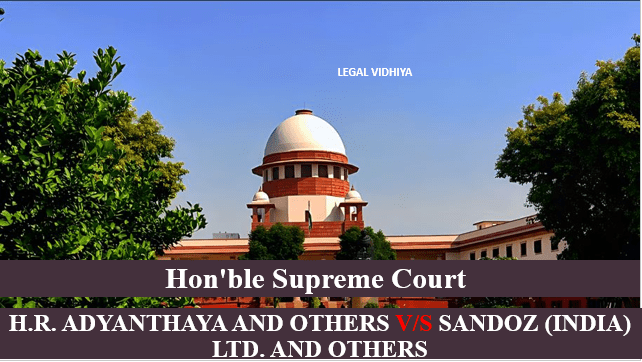
| CITATION | (1994) 5 SCC 737 |
| DATE OF JUDGMENT | August 11, 1994 |
| COURT | Supreme Court of India |
| APPELLANT | H. R. Adyanthaya and Ors |
| RESPONDENT | Sandoz ( India ) Ltd. and Ors |
| BENCH | Kuldip Singh, P. B. Sawant, S. Mohan, G. N. Ray and N. P. Singh, JJ. |
INTRODUCTION
This Appeal is submitted by the Appellants, who are dissatisfied with the judgment and order rendered by the Hon’ble Industrial Tribunal under the Maharashtra Act. The pivotal inquiry before the Hon’ble Supreme Court revolves around the determination of whether the individuals commonly referred to as “medical representatives” qualify as “workmen” within the purview of Section 2(s) of the Industrial Disputes Act, 1947.
FACTS OF THE CASE
Multiple applications were submitted for deliberation before the Hon’ble Supreme Court, pertaining to the legal position of whether “medical representatives” qualify as “workmen” as defined under Section 2(s) of the Industrial Disputes Act, 1947.
The Amendment Act 36 of 1956 to the definition of “workman” under the Industrial Disputes Act incorporated individuals engaged in ‘supervisory’ and ‘technical’ roles within its ambit. Following the enactment of Amendment Act 46 of 1982, the scope of individuals categorised as “workmen” engaged in “operational” tasks was subsequently incorporated within the purview of the definition.
These amendments, by virtue thereof, introduced a significant expansion in the scope of the definition, encompassing individuals engaged in non-manual unskilled and skilled work for the first time.
The Appellants, acting as medical representatives under companies affiliated with the respondents, initiated legal proceedings before the Hon’ble Labour Court following the termination of their employment. The Hon’ble Labour Court subsequently ruled that the medical representatives fall within the purview of “workman” as defined by the Industrial Dispute Act of 1947.
The respondents approached the Hon’ble Industrial Tribunal pursuant to the provisions of the Maharashtra Act. The Hon’ble Industrial Tribunal rendered a verdict wherein it was determined that the classification of “medical representative” shall not be deemed as that of a “workman.”
Dissatisfied, the Appellant workmen pursued an appeal before the Hon’ble Supreme Court.
ISSUE RAISED
Whether the “medical representatives”, are workmen according to the definition of “workman” under Section 2(s) of the Industrial Disputes Act, 1947?
CONTENTIONS OF APPELLANT
The Appellant asserted that the definition of “workman” as per the Industrial Disputes Act encompasses all employees, barring those falling under the few exceptions. His second argument posited that, irrespective of circumstances, medical representatives inherently engage in skilled and technical tasks, consequently classifying them as workmen within the meaning of the said definition.
The Appellant contended that the original enactment of the Sales Promoting Employees Act created a distinction between two categories of employees: those earning wages not exceeding Rs 750 per month (excluding commission) or Rs 9000 per annum (including commission), and those earning wages above these specified amounts. However, the Act’s definition only encompassed the first category of employees, which was discriminatory in nature towards the second category of employees. This discriminatory treatment is deemed to be in violation of Article 14 of the Constitution.
The Appellant stressed that the Industrial Disputes Act was amended to include the terms ‘skilled’ and ‘operational,’ and the Sales Promotion Employees Act was revised to classify all sales promotion employees as ‘workmen,’ regardless of their compensation. Consequently, it is argued that the definition of ‘workman’ within the Industrial Disputes Act encompasses sales promotion employees. Therefore, the Maharashtra Act is deemed applicable to medical representatives. The Appellant’s counsel relied on precedents such as Kasturi and Sons (P) Ltd. v. N. Salivateeswaran.
CONTENTIONS OF RESPONDENT
The respondent strongly asserts that, given that the medical representatives do not fall within the legal definition of “workmen” as per the Maharashtra Act, the complaint brought forth before the Industrial Court under said Act lacks the necessary legal foundation and must be acknowledged as such. Consequently, the complaint initiated by the appellant-workers under the Maharashtra Act in the current scenario was devoid of merit and, accordingly, appropriately dismissed by the Hon‘ble Industrial Court.
JUDGEMENT
The Hon’ble Supreme Court observed that the medical representatives do not fall within the legal definition of ‘workmen’ under the Maharashtra Act, the complaint brought forth to the Industrial Court under said Act cannot be sustained. Therefore, the appellant-workmen’s complaint under the Maharashtra Act in this case was rightly dismissed by the Industrial Court.”
The Hon’ble Supreme Court directed the State Government to categorise the employee’s complaint as an industrial dispute in accordance with the Industrial Disputes Act. It further instructed the State Government to promptly forward this matter under Section 10(1)(d) of the aforementioned Act to the Industrial Tribunal in Bombay within four weeks from August 11, 1994.
The Supreme Court directed the respondent-managements to make ex gratia payments of Rs. 100,000 to each appellant within six weeks from August 11,1994. Additionally, in the case of CA No. 242 of 1990, where an individual employee applied for bonus for the years 1977-78 to 1979-80 under Section 33-C(2) of the ID Act, the court directed that the bonus for those years be paid to the appellant-employee as ex gratia payment within the same timeframe.
CONCLUSION
In conclusion, the Hon’ble Supreme Court, after careful consideration of the legal definitions and arguments presented, determined that the “medical representatives” are not workmen according to the definition of “workman” under Section 2(s) of the Industrial Disputes Act, 1947.
REFERENCE
- SCC Online
This Article is written by Raj Nagre student of New Law College, Mumbai; Intern at Legal Vidhiya.




0 Comments